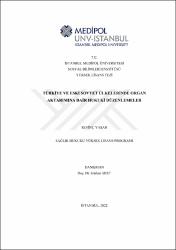| dc.contributor.advisor | Sert, Gürkan | |
| dc.contributor.author | Yaşar, Sevinç | |
| dc.date.accessioned | 2023-12-21T07:32:14Z | |
| dc.date.available | 2023-12-21T07:32:14Z | |
| dc.date.issued | 2022 | en_US |
| dc.date.submitted | 2022-05 | |
| dc.identifier.citation | Yaşar, S. (2022). Türkiye ve eski Sovyet ülkelerinde organ aktarımına dair hukuki düzenlemeler. (Yayımlanmamış yüksek lisans tezi). İstanbul Medipol Üniversitesi Sosyal Bilimler Enstitüsü, İstanbul. | en_US |
| dc.identifier.uri | https://tez.yok.gov.tr/UlusalTezMerkezi/tezSorguSonucYeni.jsp | |
| dc.identifier.uri | https://hdl.handle.net/20.500.12511/12053 | |
| dc.description.abstract | Organ ve doku nakli, tıp tarihi açısından oldukça eski bir geçmişe sahiptir. Bununla beraber, bu alandaki hukuki gelişmelerin, hukuki düzenlemelerin ortaya çıkması daha yakın geçmişte rastlamaktadır. 20. yüzyılın özellikle ikinci yarısından itibaren teknolojinin de gelişmesiyle organ ve doku nakli alanında oldukça önemli buluşlar ve gelişmeler söz konusu olmuştur. Sovyetler Birliği bu anlamda dünya tıp bilimine değerli katkılar sunmuştur. Fakat hukuki düzenlemeler açısından Sovyetler Birliğinin sona erdiği tarihlere bakıldığında, ülkede organ nakli alanını düzenleyecek sistematik kuralların, kanun ve yönetmeliklerinin olmadığını görüyoruz. Sovyetler Birliği sona erdikten sonra bağımsızlığını ilan eden Rusya Federasyonu ve diğer 14 cumhuriyette birçok alanı ilgilendiren hukuk reformları yanı sıra, organ ve doku nakline ilişkin önemli mevzuat oluşturulmuş ve halen de geliştirilmeye devam edilmektedir. Ülkemizin organ ve doku nakli alanındaki mevzuatı ile Sovyet sonrası ülkelerin mevzuatları temel olarak benzerlik göstermektedir. | en_US |
| dc.description.abstract | Organ and tissue transplantation has a very old history in terms of the history of medicine. However, the emergence of legal developments and legal regulations in this field coincides with the more recent past. Especially since the second half of the 20th century, with the development of technology, there have been very important inventions and developments in the field of organ and tissue transplantation. In this sense, the Soviet Union made valuable contributions to the world medical science. However, in terms of legal regulations when we look at the dates when the Soviet Union ended, we see that there were no systematic rules, laws and regulations to regulate the field of organ transplantation in the country. After the end of the Soviet Union, in the Russian Federation and 14 other republics which declared its independence, in addition to legal reforms concerning many fields, important legislation on organ and tissue transplantation has been created and still continues to be developed. The legislation of our country in the field of organ and tissue transplantation is basically similar to the legislation of post-Soviet countries. | en_US |
| dc.language.iso | tur | en_US |
| dc.publisher | İstanbul Medipol Üniversitesi, Sosyal Bilimler Enstitüsü | en_US |
| dc.rights | info:eu-repo/semantics/openAccess | en_US |
| dc.subject | Canlıdan Organ Nakli | en_US |
| dc.subject | Mukayeseli Hukuk | en_US |
| dc.subject | Organ Alımına Rıza | en_US |
| dc.subject | Ölüden Organ Nakli | en_US |
| dc.subject | Sağlık Hukuku | en_US |
| dc.subject | Living Donor Organ Transplantation | en_US |
| dc.subject | Comparison of Legislation | en_US |
| dc.subject | Consent to Organ Harvesting | en_US |
| dc.subject | Deceased Organ Transplantation | en_US |
| dc.subject | Health Law | en_US |
| dc.title | Türkiye ve eski Sovyet ülkelerinde organ aktarımına dair hukuki düzenlemeler | en_US |
| dc.type | masterThesis | en_US |
| dc.department | İstanbul Medipol Üniversitesi, Sosyal Bilimler Enstitüsü, Sağlık Hukuku Ana Bilim Dalı | en_US |
| dc.relation.publicationcategory | Tez | en_US |
| dc.institutionauthor | Yaşar, Sevinç | |


















